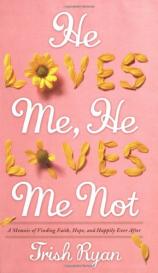Reading Group Guide
Discussion Questions
He Loves Me, He Loves Me Not: A Memoir of Finding Faith, Hope, and Happily Ever After

1. In the early chapters of He Loves Me, He Loves Me Not, Trish spends a lot of time looking for answers in books on how to fix relationships, or how to “do” spirituality. Do you think this is unusual? What role do books and/or expert authors play in influencing our search for the life we want in our society?
2. Trish is horrified by a magazine article she reads about women who had made peace with their apparent destiny as spinsters. Have you read similar articles? What do you think of the choices they suggest?
3. Trish rushes into a bad marriage convinced that, with enough effort, she could make it work. How common do you think this is? What do you make of her observation that, as bad as her marriage was, it was still easier than being single?
4. Why do you think Trish was so drawn to New Age and self-help promises? Why was it so hard for her to face the fact that the spiritual practices she’d immersed herself in weren’t working?
5. At different times in the book, Trish hears God speaking to her (in a voice that’s vaguely reminiscent of James Earl Jones). Have you ever had a similar experience? If yes, how did you respond? If no, do you think such a thing is possible?
6. For most of her life, Trish’s interactions with Christians were singularly unhelpful --- a woman shouting at her through a bullhorn in the subway station that she was going to hell, or some earnest students handing out pamphlets in Harvard Square about eternal damnation. She says, “None of them asked me, in their attempts to sell their faith, what was going on in my life --- what was missing or what I was searching for… None of them suggested that Jesus could help me here and now.” What do you make of this?
7. Trish didn’t think following Jesus was possible where she lived in the Northeast because of the cultural differences she saw between contemporary American Christianity and the world she lived in. Do you think it’s possible to be into Jesus and not become “a Christian” in this context?
8. When she starts the Forty Days of Faith, Trish pointedly ignores the advice she’d received about how she should be happy (or pretend to be) without a husband. What do you think of this choice?
9. On page 220, Trish describes the different kinds of pearls she’s seen --- some rare and treasured, some fake. How do you think women value themselves today in terms of dating? Exquisite and valuable, or expendable and easily replaced? What is the result?
10. Why is the story of Ruth so inspiring to Trish? What encouragement or guidance does it offer women? Men?
11. What do you think of the cardboard-and-glue imagery Dave uses to describe the bond that happens when we have sex?
12. Why do you think Trish fell for Adam, even though he was so much like her ex-husband?
13. A trip to Victoria’s Secret sets off a new level of insecurity for Trish regarding how she looks compared to models and actresses. She describes how Steve’s reassurances --- while appreciated --- didn’t help her conquer this fear. Have you felt this way? What do you think of the response Brian offered in that conversation?
14. He Loves Me, He Loves Me Not is structured a bit like a fairy tale --- a quest for “happily ever after.” It seems as if Trish finds this fabled land, which runs contrary to so much in our society that says there’s no such place. What do you think of the idea that “happily ever after” might be possible?
He Loves Me, He Loves Me Not: A Memoir of Finding Faith, Hope, and Happily Ever After
- Publication Date: April 17, 2009
- Paperback: 320 pages
- Publisher: FaithWords
- ISBN-10: 1599957183
- ISBN-13: 9781599957180







